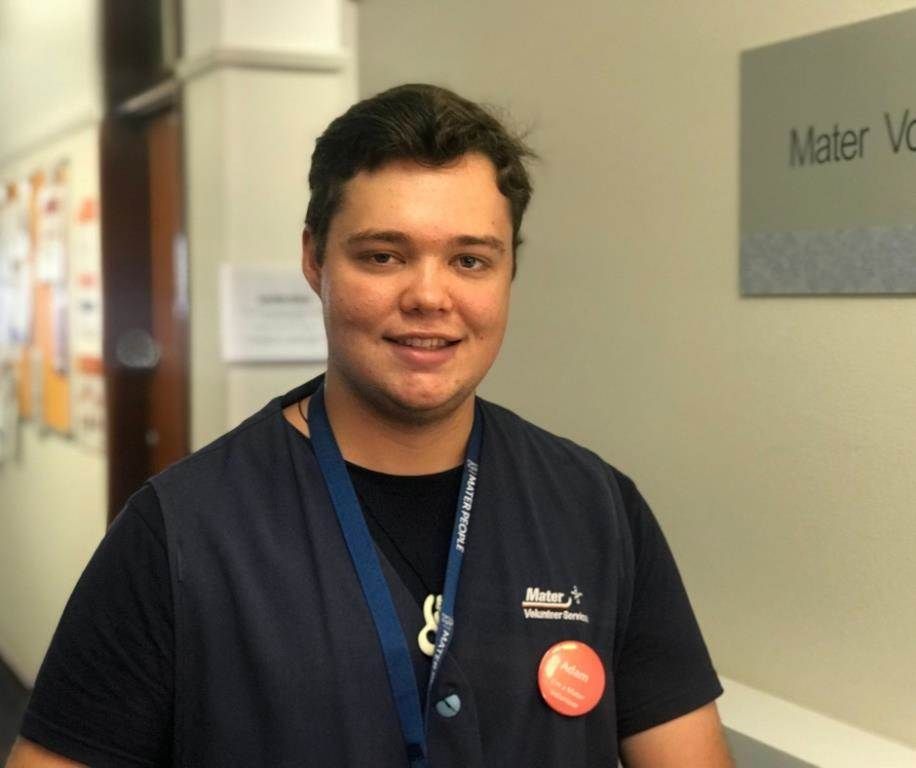Adam’s battle with severe epilepsy

When Adam Barry was six years old, he started having seizures.
At first they were manageable with medication, but as he got older the medication stopped working, and the seizures became dangerously violent, with his head repetitively smashing into whatever was beneath him as the seizure took hold.
Violent and frequent seizures are a terrifying reality for many of the 250 000 Australians living with epilepsy*, and are often something they’ll deal with for the rest of their life.
But for Adam, now aged 19, this is no longer the case. Thanks to the incredible work of Mater’s Advanced Epilepsy Unit, he’s now seizure-free.
Epileptologist Dr Sasha Dionisio, along with nurse practitioner Peter Jones and neurosurgeon Dr Jason Papacostas offered the family new hope through a specialised surgery for epilepsy. But their plan didn’t come without risks.
“Adam’s MRI scans had been normal so we undertook a Stereo-EEG (SEEG) procedure, inserting thin electrodes into the brain at various points. The SEEG detected the seizure onset site,” said Dr Dionisio.
Unfortunately it was in the area of the brain that was responsible for speaking.
“The only way we could proceed was for Adam to remain awake during his brain surgery.”
By keeping Adam awake and talking during surgery, the team would be able to identify when they were would be accessing the area of his brain that affects speech.
Dr Jason Papacostas explained the team’s process during the awake craniotomy.
“During the craniotomy I placed a grid—a sheet of electrodes—against Adam’s brain. Dr Dionisio’s team would then stimulate the grid so that I could mark on Adam’s brain exactly where language was coming from,” said Dr Papacostas.
Adam felt hesitant about the surgery when he first heard about the complexity, and the fact he’d need to remain awake throughout. But when he reflected on how much of a toll his epileptic seizures had taken on him throughout his life so far, he knew he wanted to go for it.
“I kept saying to myself — I’ve dealt with this since year one, do I really want to deal with it for the rest of my life?”
Nurse practitioner Peter Jones worked with Adam throughout his surgery, along with two speech pathologists, to ensure Adam’s speech wasn’t being affected.
“I held up flashcards of things that Adam is interested in—Star Wars, Lord of the Rings, Aztec history, the Egyptians—and asked Adam to tell me more about it. If they stimulated that part of the brain and Adam’s speech was affected, then we knew we couldn’t remove that part of the brain.”
Looking back on the surgery, Adam is surprised with how well he handled it.
“I thought I would be one of those people that might freak out in it, but for some reason I felt calm all the way through,” said Adam.
“I’d built a good relationship with the team and trusted them.”
Adam’s mother Melissa said the four hour wait for surgery was ‘enormously stressful’.
“It was the longest four hours of my life. I just about leapt on them when he came out; Adam was talking when he came into ICU—it was so emotional.”
Peter Jones explained the surgery was the most levelling experience he has ever had while working in healthcare.
“I was in tears at the end. I was overcome… being twenty centimetres away from Adam, under a shroud in the operating theatre and Adam’s fist-pumping and high-fiving me, while remembering objects on the flashcards,” said Peter.
“It was absolutely incredible.”
It’s now been almost 18 months since Adam had his surgery—and he hasn’t had a seizure since.
He now volunteers at Mater every Monday, and loves dropping by to catch up with Mater’s Advanced Epilepsy team while on his delivery rounds.
“I haven’t had any episodes, and my paranoia is completely gone,” says Adam.
“I feel like it’s a dream come true.”
For Melissa, Mater’s Advanced Epilepsy team has made a huge impact on the family.
“It’s like one of those ripples. They think ‘I’ve just healed this person’ but they’ve actually healed the whole family,” said Melissa. “Every day Adam is getting back to the guy that we knew rather than the person who was consumed by his epilepsy. “This surgery has given Adam back his life and put Adam back in our lives again.”
Surgery like Adam’s is only made possible by continued investment into research to develop new solutions for our biggest medical challenges.
You can support life-changing medical research at Mater by purchasing your Mater Prize Home lottery tickets today.
*Epilepsy Action Australia, 2019

We would love to hear from you
We would love to know what you think about Mater Lotteries!
1800 067 066
All times displayed in your local timezone unless stated otherwise. Mater Foundation Ltd as trustee for Mater Foundation is registered as a charity with the Australian Charities and Not-for-profits Commission. ABN 96723184640. All prices are displayed in AUD.



